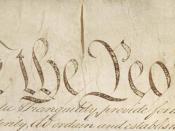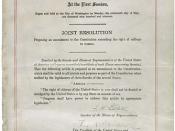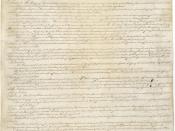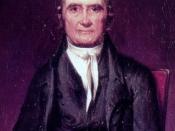When the Constitution was drafted, the men who drafted it were very particular in the way they approached the issue of slavery in our country. They carefully avoided it by only mentioning it or referring to it indirectly. They did not use the term "slave" but referred to everyone as "persons". It is rather ironic that neither the Constitution nor the Declaration of Independence, the two documents most known for establishing and declaring freedom and equality for men, never even mention slaves or slavery in a direct way. The founding fathers drafted the Constitution with the approach that the goal was to unite the nation. That is why they neither put an end to slavery nor condoned it in the Constitution. Some of them owned slaves. That along with the fact that they were trying to set up a national government with unity as a goal gave them the idea that if provisions to end slavery were to be made at that time, the southern states would not follow with ratifying the Constitution.
Ultimately the framers tip toed through the issue and tried to advocate equality while avoiding the topic of slavery.
How did they manage to do this? Like any transaction or agreement done throughout history in any area of life, be it business, politics, or something else, compromise was needed. The framers of the Constitution made a major decision that became known as the "three-fifths compromise". This compromise is found in Article I, Section 2, Clause 3 of the Constitution, and says:" Representatives and direct Taxes shall be apportioned among the several States which may be included within this Union, according to their respective Numbers, which shall be determined by adding to the whole Number of free Persons, including those bound to Service for a Term of Years, and excluding Indians not taxed, three fifths of all other Persons. "The Three-Fifths Compromise had immediate impact on the political framework of our country. Because slaves were counted and not just the free population and because the southern states had the population of the slaves, the south was represented more often in the offices of President, House Speaker, and Supreme Court Justices. This trend continued until the civil war (Unknown, 2009). But probably more importantly this clause became a forerunner and set a precedent of sorts for other clauses in our constitution that referenced slavery indirectly and called for compromise between the northern states and southern states. Because of this the clause had tremendous impact on the ratifying of the Constitution and the history of our nation. By allowing for a compromise at the time, the delegates from the north allowed the door for the ultimate doing away of slavery to remain open. Without the compromise the southern states may not have joined the union and ultimately slavery would have continued longer than it did.
Along with the three-fifths compromise, slavery is referenced indirectly in a couple of other places in the Constitution. Article I and Section 9, Clause 1 says:"The Migration or Importation of such Persons as any of the States now existing shall think proper to admit, shall not be prohibited by the Congress prior to the Year 1808, but a Tax or duty may be imposed on such importation, not exceeding tend dollars per person." (U.S. Constitution)This is referring to the slave trade. Southerners were willing to pay the taxes with the trade-off being higher representation and control of the House. This also showed compromise between the north and south and indirectly referenced the issue of slavery without using the word directly. The framers of the Constitution believed this the best way to deal with the slave trade situation and believed that slavery could be outlawed later. It showed their insight into the fact that money (by the taxing involved) could be used to bring about political changes later. Higher importation taxes would mean it would be higher for slave owners to buy the slaves. Prior to 1808 a provision for outlawing slave importation was adopted and then in 1808 Congress ultimately banned the importation of slaves.
What is known as the "Fugitive Slave Cause" is also in the Constitution - Article IV, Section 2, Clause 2. This clause basically protected the rights of slaveholder's as the owners of slaves (slaves were treated as property). Again the words "slave" or "slavery" are not used. The clause says:"No person held to service or labor in one state, under the laws thereof, escaping into another, shall, in consequence of any law or regulation therein, be discharged from such service or labor, but shall be delivered up on claim of the party to whom such service or labor may be due."Under the clause slaves had to be returned to their owners. In protecting the personal property of the slaveholders, it essentially protected their wealth. This in turn obviously helped the economy of the south. Without slaves the plantation system wouldn't be successful.
It is interesting that in all three of these cases where slavery is referenced, the issue of slavery itself is skirted but themes of property and money come into the picture. Going hand in hand with wanting to unite the country, economics was a factor in the avoiding of the slavery issue. Frankly and simply, slaves helped and enhanced the economy of our country (and the personal economies of many individuals). In the south, the whole agricultural economy was dependent on slavery. The slave labor (which was hard, physical labor) was key to maximizing crop output. If slavery had been addressed directly by the framers with a likely split by the south occurring, then there would have been no taxation on those slaves. Essentially slavery was a revenue generator. The treating of slaves as "property" and "imported goods" were forms of concession and compromise until the nation was more solidified.
The ultimate goal of the framers of the Constitution was to unite our country. Although they did not confront slavery they did place certain clauses within it that meant some concessions by both the southerners and people who were for slavery and the people who were against it. Ultimately these concessions helped in the ratifying of the Constitution and the uniting of our country. The compromises helped them achieve their ultimate goal.
Works CitedConstitution of the United StatesUnknown, (2009). Triangular Trade. Retrieved January 25, 2009 from Wikipedia web site: http://en.wikipedia.org/wiki/Three-fifths_compromise







